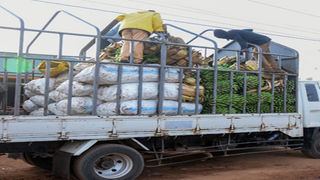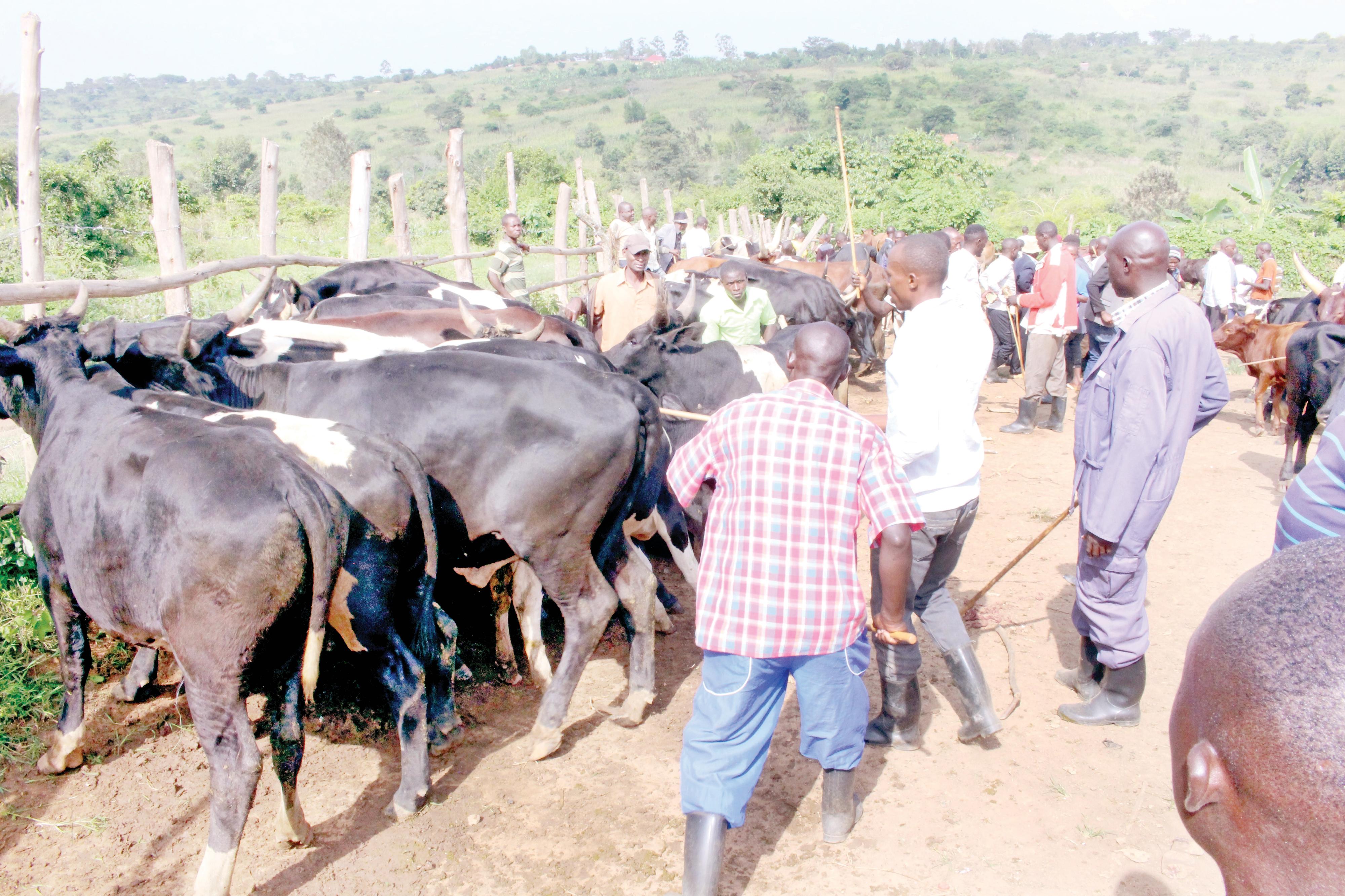
A man sits on a truck transporting matooke to Kampala for sale. There are several high-income earners engaged in agricultural activities that are sheltered almost completely from any form of taxation. PHOTO / Michael Kakumirizi
Prosper
Prime
To tax agriculture or not? Which way for Uganda?
What you need to know:
While many participants in the agriculture sector are smallholder or subsistence farmers, internal URA investigations show that there are also highly profitable suppliers of agricultural products that pay little or no taxes.
The government’s financial year calendar closed with the agriculture sector registering strong performance, according to the Finance ministry records.
Agriculture sector, going by the 2023/2024 Financial Year (FY) budget speech grew by 5 per cent despite the dry spell in the first quarter of the just-ended financial year.
In particular, food crops, livestock and fishing, according to the budget speech pronouncement, performed “marvelously” well.
Available government data, further indicates that six out of 10 households in the country are already in the money economy as special purpose vehicle code named Parish Development Model (PDM) – touted by President Yoweri Museveni, as the magic bullet, aims at delivering the remaining 40 per cent households currently stuck in subsistence farming to commercial agriculture, going forward.
Government efforts to ensure farmers across the country access quality seed, planting and stocking material, disease and pest control, research, extension and overall policy guidance, all with an intention of making a killing out of agriculture sector where so many policy makers across the three arms of government continue to find refuge and take solace, is a positive stride if it works for everybody.
In his state of the nation address last month (on June 7, 2023) at Kololo Ceremonial Grounds in Kampala, President Museveni revealed that agriculture sector, accounting for 24 per cent of GDP, grew by 4.4 per cent in the FY 2021/22 as compared to 4.3 per cent in the FY 2020/21. He noted that the value of agricultural exports registered a growth of 24 per cent from $1,678 million $2,085 million in same period. This growth, he said, was attributed to the increased volumes and quality of coffee, dairy, fish and tea.

A herder watches over cows at Kampala City Abbatoir. Agricultural sector holds the biggest potential for improving tax revenue performance in the long run. PHOTO/ MICHAEL KAKUMIRIZI
In the current budget, Shs2.2 trillion has been allocated for food security, irrigation, climate change mitigation, value chain development, agricultural research and disease control, an investment that Prof. Augustus Nuwagaba, an international consultant on economic transformation, applauds.
Tax or not to tax?
Now, to tax or not to tax agriculture, that is the question.
This is particularly important considering all the investment that has been sunk into the sector for the last four decades of NRM reign. For the private sector apex body in the country, the Private Sector Foundation Uganda, the point at which agriculture should be taxed is the crux of the matter.
“Tax the products,” PSFU chief executive officer, Mr Stephen Asiimwe told Prosper Magazine in an interview last week.

PSFU chief executive officer Stephen Asiimwe.
But for economist and policy advisor, Dr Fred Muhumuza, it is unfair for a livestock farmer to sell “a truck full of cattle” and not contribute anything to the tax kitty despite earning taxable income. The same, he said, goes to a crop farmer who sells several bags of say maize and does not pay anything to the tax collector.
He suggests that taxing farmers practising agriculture of any kind may not be done at the farm gate, given that infrastructure to make that happen is either wanting or lacking, suggesting that: “it can be tax on transit.”

Matooke for sale at Kalerwe Market. PHOTO/ MICHAEL KAKUMIRIZI
“Tax the trucks carrying those cattle or bags of maize or whatever the produce. You don’t have to go to the villages but you can tax moving milk or vehicles transporting these commodities,” said the former advisor at the Finance Ministry.
He continued: “This can be an activity that Local government can undertake, and the resource should be allowed to remain and deployed at local government level.”
Issue on the table
To widen the tax base which agriculture sector has always eluded, despite having about 80 per cent of the population deriving their livelihood from this sector, technocrats and economic mangers at the Ministry of Finance are conducting a study whose findings according to the Director Economic Affairs at the Ministry of Finance, Mr Moses Kaggwa, will shortly provide a clear understanding, modalities and basis for taxing the sector accounting for nearly a quarter of the country’s GDP but contributes less than 1 per cent of tax revenue.
Tax evasion
While many participants in the agriculture sector are smallholder or subsistence farmers, internal URA investigations show that there are also highly profitable suppliers of agricultural products that pay little or no taxes.
This is according to a study titled: Taxing Agricultural Income in the Global South: Revisiting Uganda’s National Debate, done by International Centre for Tax and Development.
The study indicates that anecdotal evidence from countries like Uganda suggests that there are a substantial number of high-income earners engaged in agricultural activities that are sheltered almost completely from any form of taxation yet taxing these high-income earners could provide the much-needed resources to finance the country’s “deficit budget”.
Taxation of the agriculture sector has always elicited intense political contestation largely due to the fact that most, if not all the policy makers, politicians, technocrats and people in positions of power and influence in the country, many of whom are looking out for their own interest, are heavily involved in this sector.
In 2018, Parliament adopted a revised 1 per cent withholding tax (WHT) on the supply of agricultural products, and despite this measure contributing some revenue in its first year of enforcement, it faced strong political criticism before being abandoned a year later in 2019.
Time up for taxing agriculture?
According to the author of the aforementioned study, the time is ripe, to revitalise discussions about how best to tax the agriculture sector, a discussion that Permanent Secretary and Secretary to the Treasury, Finance Ministry Dr Ramathan Ggoobi, has since reinstated on the table.
In his presentation during the 2023/2024 NTV and Absa post budget dialogue, he argued in favour of taxing agriculture, saying it is almost unimaginable for a sector that makes up almost a quarter of the country’s GDP contributing almost nothing to the revenue kitty, stressing that this trend “needs to change if the tax base is to be widen.”
Speaking on the sidelines of the Treasurer’s meeting recently, the acting head of financial markets at Post Bank, Mr Huzairu Iga, appeared to side with Dr Ggoobi. He said with the bulk of the budget investment bending towards supporting agriculture – both directly and indirectly, it is about time the sector contributes its fair share of taxes.
In an interview with the Minister of State, General Duties, Mr Henry Musasizi, noted there is still a lingering debate over taxing agriculture even though it could be one of the ways to quickly result into widening the tax base.
Before taxing agriculture, Mr Musasizi, believes massive investment must be injected into the sector to develop and grow it.
He was also of the view that taxation shouldn’t be necessarily direct, arguing that the income a farmer gets after selling a cow will boost his or her purchasing power, enabling him or her to buy basic household commodities such as salt, sugar, and clothes or even fuel a car, all of which attract taxes which goes to the national coffers.
“We may not need to tax the income earned from the cow directly, but enhance purchasing power. The same principle applies to a boda-boda. So I do not support the idea of taxing such operations. Allow the boda-boda to operate and tax them indirectly,” Mr Musasizi told Prosper Magazine.
When contacted, Prof Nuwagaba noted that taxing agriculture in its current form will not be progressive.
He said: “What will work is investing in agro-processing because this makes it easy for taxing purposes. This is because it will be easy to know the number of bags of packed maize flour and difficult to understand number of cobs of maize from a particular garden which is often times shipped and sold raw.
“Therefore, taxing agriculture will make more sense at secondary level and not the current level raw level of produces where we are at.”
However in the short and medium term, there are four potential strategies that Uganda could pursue to collect taxes more fairly from the agriculture sector, according to International Centre for Tax and Development.
“First, Parliament could reinstate some level of WHT on the sector. While politically controversial, WHTs are one of the only ways to successfully collect income taxes from the sector.
Secondly, URA could upgrade the existing WHT system to require the clear identification of agricultural suppliers. Suppliers could then be tracked more effectively to ensure they are complying with existing income tax obligations.
“Third, the URA could put its internal data to better use by specifically targeting the largest agricultural suppliers – who are also likely to be the most profitable – to make sure that they are registered with the URA and complying with their existing tax obligations.
“Fourth, URA could increase enforcement on non-compliant agricultural suppliers, beginning with the largest firms,” recommends the study by International Centre for Tax and Development, for Uganda,” Prof Nuwagaba said.





